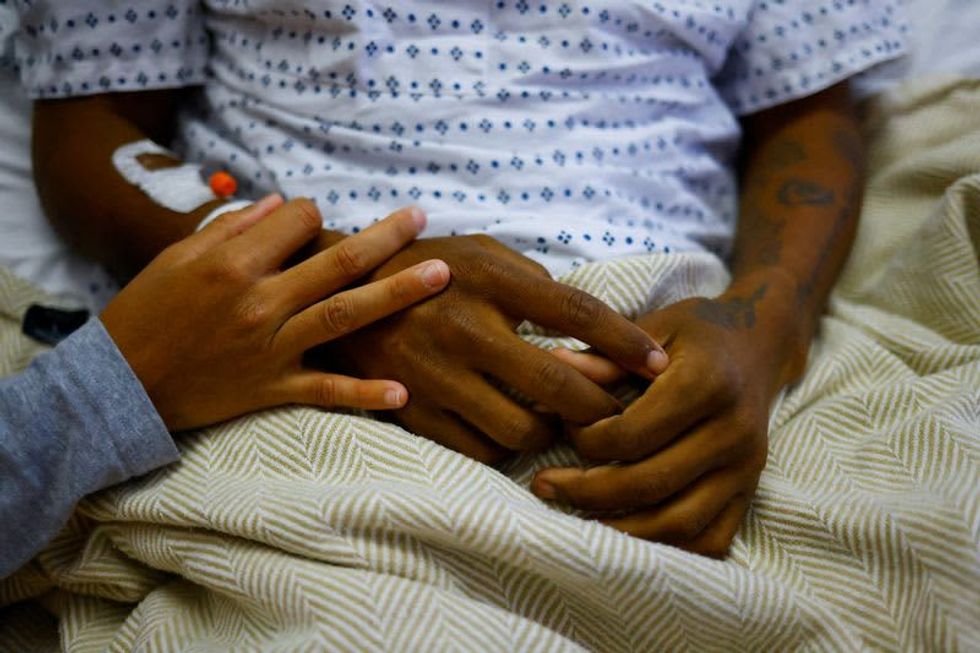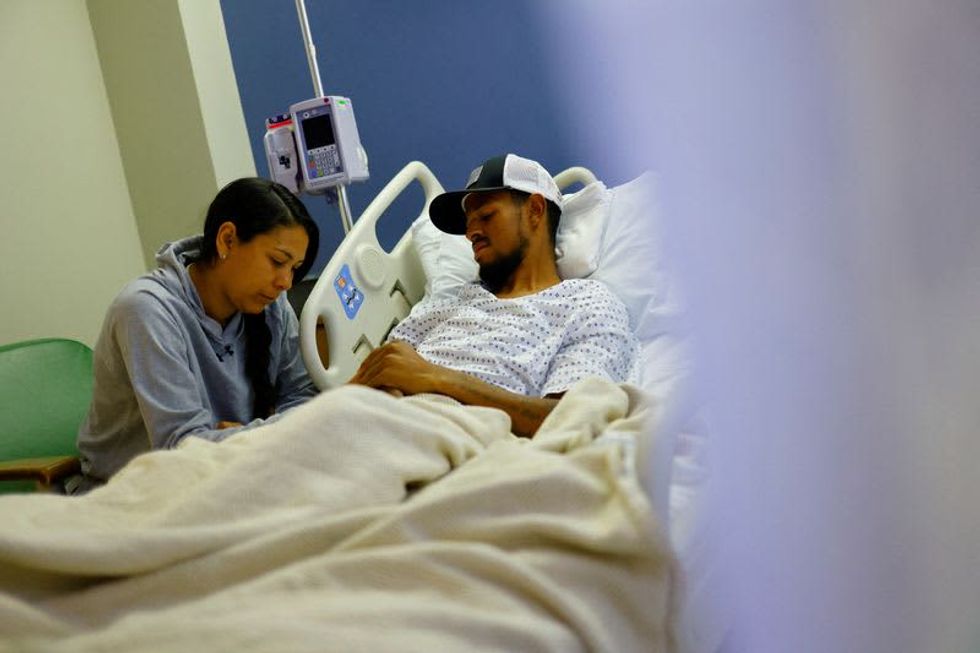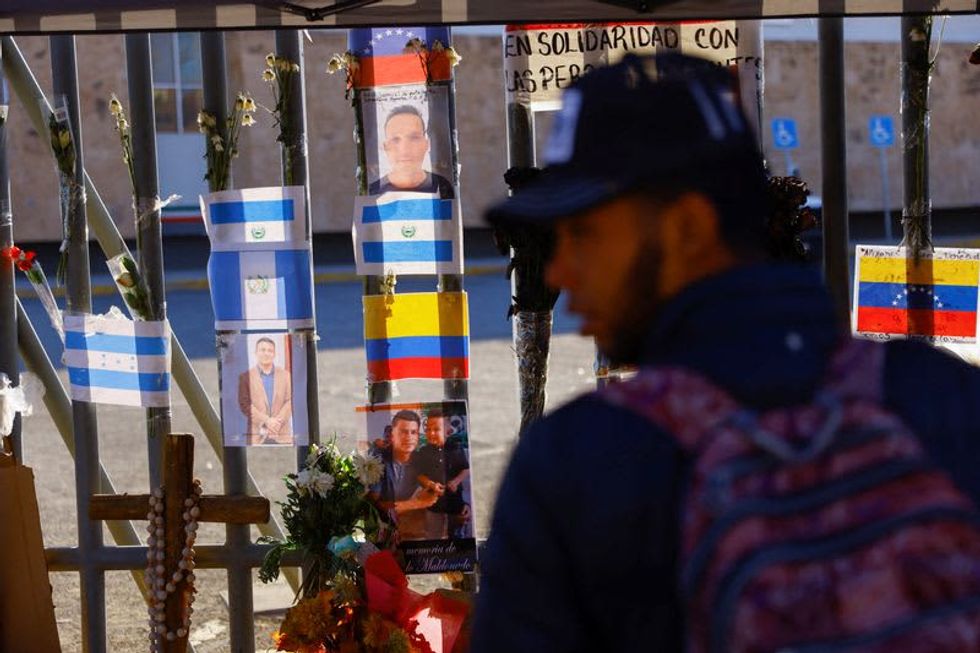
By Lizbeth Diaz
CIUDAD JUAREZ, MEXICO
(Reuters) -Eduard Caraballo screamed for help.
Thick suffocating smoke was filling the cell where he was held with over 60 other migrants in northern Mexico, but there was no way out. The single door was locked shut.
"We screamed for them to open the cell door, but no one helped us," Caraballo, 26, said through tears during a phone interview from his hospital bed.
One by one people began to die, he said.
In total, 40 people were killed in the fire last Monday in one of the deadliest migrant tragedies in years.
Mexican prosecutors say they are investigating the fire as a possible homicide and arrested five people last week in connection with the incident. The probe is focusing on why the male migrants held at the center appeared to be left in their cell while the fire burned, while women detainees were safely evacuated from a neighboring cell.
Officials blamed the fire on a migrant who allegedly set mattresses alight to protest their imminent deportation.
A short video circulating on social media - appearing to be security footage from inside the center during the blaze - showed men kicking on the bars of a locked door as their cell filled with smoke.
Three uniformed people can be seen walking past without trying to open the door. Investigators have said the video is part of the probe.
Mexico's National Migration Institute, which ran the center in the border town of Ciudad Juarez, did not immediately respond to a request for comment on Caraballo's account.
Caraballo, a Venezuelan migrant, said he survived by soaking his sweater in water, covering his face, and moving to the bathroom at the back of the cell.
As the fire started, all the lights went out, he recalled.
"When I saw everything begin to fill with smoke, I worried a lot about my family," he said. "My God, don't let me die."
The last thing he remembers were desperate screams, and how, using a "heavy object" someone finally bashed open the door of the cell.
"They pulled me by the hand, I think it was a firefighter, and they helped me out, others were already dead," he said, crying.
Caraballo was transferred on Saturday to a hospital in El Paso after he and his family received humanitarian parole to enter the United States. He is still on oxygen and being treated for smoke exposure.
He is anxious to get better so he can be fully reunited with his family and start a new life in the United States.
Like millions of others, Caraballo and his family fled Venezuela's economic and political crisis, setting off for the United States last October.
The young father was the first to be able to cross into the United States, via the government's CBP One scheme which allows some migrants to formally enter the United States, but returned to Mexico in February after his infant daughter fell ill.
He never imagined it might cost him his life.
Caraballo was detained around midday last Monday and locked in the cell. As the fire broke out his wife was waiting outside, expecting him to be released.
"I could hear my wife's screams from the ambulance they loaded me into, then I lost consciousness," he said. "It was hell."
(Reporting by Lizbeth Diaz; Writing by Oliver Griffin; Editing by Stephen Eisenhammer and Aurora Ellis)



Thick suffocating smoke was filling the cell where he was held with over 60 other migrants in northern Mexico, but there was no way out. The single door was locked shut.
"We screamed for them to open the cell door, but no one helped us," Caraballo, 26, said through tears during a phone interview from his hospital bed.
One by one people began to die, he said.
In total, 40 people were killed in the fire last Monday in one of the deadliest migrant tragedies in years.
Mexican prosecutors say they are investigating the fire as a possible homicide and arrested five people last week in connection with the incident. The probe is focusing on why the male migrants held at the center appeared to be left in their cell while the fire burned, while women detainees were safely evacuated from a neighboring cell.
Officials blamed the fire on a migrant who allegedly set mattresses alight to protest their imminent deportation.
A short video circulating on social media - appearing to be security footage from inside the center during the blaze - showed men kicking on the bars of a locked door as their cell filled with smoke.
Three uniformed people can be seen walking past without trying to open the door. Investigators have said the video is part of the probe.
Mexico's National Migration Institute, which ran the center in the border town of Ciudad Juarez, did not immediately respond to a request for comment on Caraballo's account.
Caraballo, a Venezuelan migrant, said he survived by soaking his sweater in water, covering his face, and moving to the bathroom at the back of the cell.
As the fire started, all the lights went out, he recalled.
"When I saw everything begin to fill with smoke, I worried a lot about my family," he said. "My God, don't let me die."
The last thing he remembers were desperate screams, and how, using a "heavy object" someone finally bashed open the door of the cell.
"They pulled me by the hand, I think it was a firefighter, and they helped me out, others were already dead," he said, crying.
Caraballo was transferred on Saturday to a hospital in El Paso after he and his family received humanitarian parole to enter the United States. He is still on oxygen and being treated for smoke exposure.
He is anxious to get better so he can be fully reunited with his family and start a new life in the United States.
Like millions of others, Caraballo and his family fled Venezuela's economic and political crisis, setting off for the United States last October.
The young father was the first to be able to cross into the United States, via the government's CBP One scheme which allows some migrants to formally enter the United States, but returned to Mexico in February after his infant daughter fell ill.
He never imagined it might cost him his life.
Caraballo was detained around midday last Monday and locked in the cell. As the fire broke out his wife was waiting outside, expecting him to be released.
"I could hear my wife's screams from the ambulance they loaded me into, then I lost consciousness," he said. "It was hell."
(Reporting by Lizbeth Diaz; Writing by Oliver Griffin; Editing by Stephen Eisenhammer and Aurora Ellis)



Migrants treated 'like criminals' in Mexican immigration centers
Agence France-Presse
April 01, 2023

The immigration detention center in Ciudad Juarez near the US border where 39 migrants died in a fire(AFP)
Luisa Jimenez thought she was visiting an office to regularize her stay in Mexico, but instead she found herself detained in an immigration center similar to the one where dozens of migrants perished in a fire.
"It's a holding cell, a detention center, like we're criminals," the Venezuelan migrant told AFP in Ciudad Juarez, where 39 people died and 27 were injured in the blaze that began on Monday.
Jimenez said the facility where she was held was in Tuxtla Gutierrez in the southern state of Chiapas.
She was taken there with the promise that she would be given a permit to remain in Mexico while seeking asylum in the United States.
The video player is currently playing an ad.
Jimenez was actually notified that she had to leave the country, she added.
"It's a disgusting place," the 56-year-old woman said, describing conditions similar to those in Ciudad Juarez.
The tragedy there unfolded after a migrant lit a fire in apparent protest over deportations, according to authorities, who have accused immigration officials and guards of failing to even try to evacuate the migrants.
Arrest warrants have been issued against three officials, two private guards and a migrant who allegedly started the fire, as part of a homicide investigation.
Just a week earlier, Moises Chavez was held in the same cell, which he described as a smelly room where guards treat migrants with disdain.
"There are no fire extinguishers or smoke detectors, but there are cameras," the 41-year-old Nicaraguan told AFP.
It was the second time that Chavez had been taken to the National Institute of Migration facility, where the fire claimed the lives of 18 Guatemalans, seven Salvadorans, seven Venezuelans, six Hondurans and one Colombian.Harsh conditions -
Video surveillance footage appeared to show guards leaving the 68 detainees locked inside as flames spread and smoke filled the room.
Ostensibly, such facilities are service and accommodation centers for foreigners who cannot prove their legal stay in Mexico.
In reality "you're treated like a prisoner," said Yusleidy Garcia from Venezuela, who was detained in Ciudad Juarez, where women and men are held in separate places.
"It was cold at night. They take away all your belongings. In the cell where I was there were 150 people" of various nationalities, she said.
Such conditions are in sharp contrast with rules issued by the government in 2012 requiring adequate food, hygiene protocols and protection of people and property in the event of riots.
Migrants are not supposed to remain in temporary-stay centers like the one that caught fire for more than seven days.
Some are transferred to other immigration facilities -- where the stay must not exceed 15 days -- to resolve their situation and receive legal assistance, and may be deported.
'Not shelters' -
Mexican immigration last year detained at least 281,149 people in "overcrowded" centers and deported at least 98,299 people, including unaccompanied children, Amnesty International said this week in an annual human rights report.
Following Monday's fire, the rights group called for "an end to the practices that have caused untold damage, including torture and cruel, inhuman and degrading treatment, to thousands of migrants who have passed through these centers."
"These facilities are not 'shelters,' but detention centers, and people are not 'housed' there, but deprived of their freedom," Amnesty said, alluding to statements by President Andres Manuel Lopez Obrador.
The United Nations office in Mexico noted that the Global Compact for Safe, Orderly and Regular Migration -- an intergovernmentally negotiated agreement -- outlaws arbitrary detentions and calls for legal detentions to be as short as possible.
Other international standards advocate alternatives to arrest, the UN said.
Jimenez's detention lasted for two days, following a long and dangerous journey during which she said she slept next to the bodies of migrants who died in the Darien jungle between Colombia and Panama.
Outraged at being locked up when she was only trying to regularize her status, she recounted asking an immigration official: "Is it a crime to migrate?"
"She turned her back on me and left," Jimenez said.
© Agence France-Presse
Agence France-Presse
April 01, 2023

The immigration detention center in Ciudad Juarez near the US border where 39 migrants died in a fire(AFP)
Luisa Jimenez thought she was visiting an office to regularize her stay in Mexico, but instead she found herself detained in an immigration center similar to the one where dozens of migrants perished in a fire.
"It's a holding cell, a detention center, like we're criminals," the Venezuelan migrant told AFP in Ciudad Juarez, where 39 people died and 27 were injured in the blaze that began on Monday.
Jimenez said the facility where she was held was in Tuxtla Gutierrez in the southern state of Chiapas.
She was taken there with the promise that she would be given a permit to remain in Mexico while seeking asylum in the United States.
The video player is currently playing an ad.
Jimenez was actually notified that she had to leave the country, she added.
"It's a disgusting place," the 56-year-old woman said, describing conditions similar to those in Ciudad Juarez.
The tragedy there unfolded after a migrant lit a fire in apparent protest over deportations, according to authorities, who have accused immigration officials and guards of failing to even try to evacuate the migrants.
Arrest warrants have been issued against three officials, two private guards and a migrant who allegedly started the fire, as part of a homicide investigation.
Just a week earlier, Moises Chavez was held in the same cell, which he described as a smelly room where guards treat migrants with disdain.
"There are no fire extinguishers or smoke detectors, but there are cameras," the 41-year-old Nicaraguan told AFP.
It was the second time that Chavez had been taken to the National Institute of Migration facility, where the fire claimed the lives of 18 Guatemalans, seven Salvadorans, seven Venezuelans, six Hondurans and one Colombian.Harsh conditions -
Video surveillance footage appeared to show guards leaving the 68 detainees locked inside as flames spread and smoke filled the room.
Ostensibly, such facilities are service and accommodation centers for foreigners who cannot prove their legal stay in Mexico.
In reality "you're treated like a prisoner," said Yusleidy Garcia from Venezuela, who was detained in Ciudad Juarez, where women and men are held in separate places.
"It was cold at night. They take away all your belongings. In the cell where I was there were 150 people" of various nationalities, she said.
Such conditions are in sharp contrast with rules issued by the government in 2012 requiring adequate food, hygiene protocols and protection of people and property in the event of riots.
Migrants are not supposed to remain in temporary-stay centers like the one that caught fire for more than seven days.
Some are transferred to other immigration facilities -- where the stay must not exceed 15 days -- to resolve their situation and receive legal assistance, and may be deported.
'Not shelters' -
Mexican immigration last year detained at least 281,149 people in "overcrowded" centers and deported at least 98,299 people, including unaccompanied children, Amnesty International said this week in an annual human rights report.
Following Monday's fire, the rights group called for "an end to the practices that have caused untold damage, including torture and cruel, inhuman and degrading treatment, to thousands of migrants who have passed through these centers."
"These facilities are not 'shelters,' but detention centers, and people are not 'housed' there, but deprived of their freedom," Amnesty said, alluding to statements by President Andres Manuel Lopez Obrador.
The United Nations office in Mexico noted that the Global Compact for Safe, Orderly and Regular Migration -- an intergovernmentally negotiated agreement -- outlaws arbitrary detentions and calls for legal detentions to be as short as possible.
Other international standards advocate alternatives to arrest, the UN said.
Jimenez's detention lasted for two days, following a long and dangerous journey during which she said she slept next to the bodies of migrants who died in the Darien jungle between Colombia and Panama.
Outraged at being locked up when she was only trying to regularize her status, she recounted asking an immigration official: "Is it a crime to migrate?"
"She turned her back on me and left," Jimenez said.
© Agence France-Presse
No comments:
Post a Comment